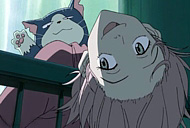
FLCL
I'm still reeling.
FLCL (pronounced "foo-lee koo-lee" in the show) is very likely the most bizarre anime series ever created. Now there are certainly films out there that are even more wacked and artsy, and there are television series such as Evangelion that become freak shows, but FLCL's insanity starts five minutes in and never stops for all of its six episodes. The average viewer will be utterly and completely stumped after the first half-hour. That feeling will not end even three hours later after the last frame fades to black. That being said, FLCL is also the most creative, original, outrageous piece of work to come out in a very long time. Animated by GAINAX, the studio behind countless programs that have pushed the envelope, this show dares you to understand it, teases you to like it, then throws another curve ball at you. Not everyone will like FLCL; it doesn't want to be liked. It wants to destroy the boundaries of what anime can be. Any anime fan that wants to witness the cutting edge of anime simply must see it.
To try and tell you the plot of FLCL would be akin to explaining color to a blind man--you can try all you want, but until you've experienced it, it's pretty much impossible. The setup, however, is a reasonable start. Naota is just about ready to go into junior high school. He lives in a bizarre near future in a relatively normal town, except for a mysterious factory shaped like a giant iron that popped up overnight and has been around ever since. He lives with his father, a bakery owner and wannabe author who's pretty much a freak, and his grandfather who's along for the ride. His older brother Tasuku is studying in America; Tasuku's delinquent girlfriend, Mamimi, keeps hanging around with Naota in search of companionship. If that weren't enough weird influences, Naota's life gets even stranger when Haruko, a crazy redhead who claims she's an alien, runs over him with a moped, gives him mouth to mouth resuscitation, and finishes the job by whacking him over the head with her bass guitar. Then she moves in as his family's maid. And this is the first ten minutes.
FLCL defies description, and I almost hesitate to put it in the comedy section since it is also a drama, a romance, and an action show. However, the one link that holds the mess together is comedy; whenever it gets too bizarre, it's the humor that keeps things moving, so that's the best way to look at it. Although subplots generally resolve themselves in some way in each episode, the overarching concept isn't even fathomable until the very end. It's a show to watch and rewatch to catch everything you missed the first time around. Even then, not everything will make sense, and it isn't meant to. This is ultimately the most frustrating part of FLCL, but perhaps also its key. There is almost certainly a metaphorical explanation for virtually everything that logic can't account for. When you take into consideration the concept of the show as (partially) a giant metaphor for puberty and the madness of the adult world, certain logic-bending snippets might indeed have a meaning after all.
FLCL has issues with its plot. However, it successfully covers much of that flaw with characters that feel incredibly real, with flaws and frailty and something deep behind their big eyes. Noata and Mamimi could exist in the real world just as they are. We relate with them because they can't explain a thing either; they are trapped in the same state we as viewers are. You can't pull away when your reasonable mind says "enough of this nonsense" because somehow, these two are worth caring about. It is the characterization that frees this show from convention; with lesser characters, I would have been done after the first episode.
Meanwhile, the highlights of the show are its music, its animation, and its humor. A rock soundtrack is playing virtually throughout the whole show, just in the background enough to notice but not driving it often. This soundtrack, mostly by a group called The Pillows, is fantastic. Anyone who likes modern rock will want to pick up the CDs, and I would be very surprised if somebody like TokyoPop doesn't buy the rights to release them here. Meanwhile, the animation is stunning. It blends traditional animation with occasional computer work, but you'd never know it. However, that's hardly the end of it. At times, the show becomes an animated manga; at others, it steals judiciously from animation from America. It is unpredictable, and it is solidly entertaining, especially with its allusions to George Plimpton, Ralph Bakshi, and others. Finally, the humor is nothing short of astounding. The show is self-referential; it knows that it is beyond comprehension and even makes mention of the fact in the last couple of episodes. It parodies tons of the animated canon, and it doesn't limit itself to anime (including a priceless bit on "South Park"). With all the absurdity, the laughter helps.
I can't give FLCL a "must see" rating. This isn't because the show's not stunning or witty or funny. It is. It's not that it's not a personal favorite--the more I think about it, the more it's becoming one. It's because great anime goes beyond fancy visuals and quirky happenings. Great anime evoke an emotional response--exhilaration, loss, hope--something beyond pen and ink and paint. FLCL will spark, for the most part, confusion. The casual viewer will throw it aside. Art critics might disagree with me, but great art has to be accessible, even if its purpose is to shock...you can't reach a viewer even to stun them if the viewer just can't understand. Here, the experience is the thing, and I had a smile at the end of each episode of FLCL. But understanding? Good luck.
FLCL -- comic violence, very brief nudity, sexual innuendo, mildly headache inducing -- A-

